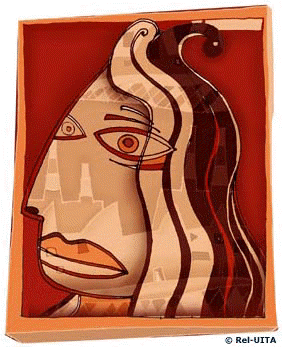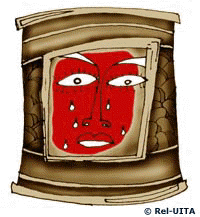|
Brazil
|
|
Testimonial by
Sergio da Silva,
former Nestle
worker
This has
completely changed our lives |
|
Repetitive
Strain Injuries (RSIs) and the socio-economic context in
which they are produced, clearly demonstrate the clash
between two opposed interest groups: the companies - in this
case the Nestlé factory in Araras, São Paulo State, Brazil,
with its morally enslaving and physically devastating
working conditions - and the workers - victims of their own
belief in the social order, where "a wolf" uses its
influence "to eat them better," betrayed, damaged, but
finally pulling together and fighting to get their rights
recognised and to help prevent others suffering as they
have.
To enter the
world of RSIs we must extend our field of sensitivity, we
must control our anger and work together using the power of
this indignation to fuel a positive movement.

Sergio da Silva,
34 years-old,
married, 3 children.
Bborn in Araras.
I worked for Nestlé from May 1989 to June 2003. When
I started I was 19 years old and it was like a dream come
true, because I had heard such good things about the
company, a serious, solid multinational. I fought to get in
there. I started as a helper doing quantity control on
long-life products. I also had to put all of this into boxes
and stack the boxes on pallets. Then I was promoted to the
packaging section where I stayed for a year and then I went
to the packing room. There I had to feed the machine with
packaging materials like reels and tapes. At that time all
of this was done manually with no mechanical aid. I don't
remember how much the reels weighed, but they had 4,500
laminated packets on them. I also put various products into
boxes manually. Both tasks implied repetitive movements.
Several years later I became a machine operator, but by then
I almost never had an assistant to help me and I had to do
both functions at the same time. Defective packages had to
be taken off the line and emptied into 50 litre drums so
that the contents could be recycled. To do this you had to
bang the package on the edge of the drum and squeeze it so
the contents would come out fast. You had to keep an eye on
the machine at the same time or the work got disorganised
and the bosses would come and ask for explanations. Between
1,200 and 1,500 packages would break each day. These
accounted for so many jolts on the hand, wrist, arm and
shoulder. There were other things that had to be dealt with
on the machine, one of those was going up a small staircase
to make a check, but this had to be done in fractions of a
second. You could not drop below 97% of production standards
because the bosses bullied and threatened. They had reduced
the staffing on other machines so much that some colleagues
couldn't cope, and we tended to help each other out when we
could.
 About
six years ago I started feeling pain in my arms and ribs,
but due to pressures both within in the factory and outside
-due to high unemployment- I avoided going to the doctor
because I knew the company did not accept any illness that
had no visible symptoms. Only you are aware of how much pain
you are in. I took painkillers and shortly after the pain
would ease off for the rest of the shift, but it would start
over again the next day. In my section we had almost daily
meetings, some during working hours and some not. Not
attending them was seen as a sign of disinterest from the
staff, by the company. In the meetings there was great
pressure on productivity, competitiveness in the market,
quality, and it always came back to the same point: "If you
are not prepared to make the effort, the streets are full of
people who would kill to work for Nestlé." This gets
into your head, you think of your family, your children, and
you say you will do anything to keep your job, even working
on with the pain. And the days kept on passing, until the
time came that I found the pain impossible to bear. I went
to a doctor outside of working hours and took along the
x-rays of my back. I told him the back pain ran up to my
shoulders, and that when I went to the reading room at break
time I couldn't hold the newspaper because my arms hurt so
much. I asked him to do a scan because I had never had such
severe pain. But the doctor had already seen Nestlé
workers with the same problem, and as with all of them,
instead of doing a scan he ordered another x-ray and a blood
test for uric acid. I did everything he said and he
prescribed me two drugs to take daily. One of these had
something that upset my stomach, but I carried on working
all the same. One Thursday I decided to go to the doctor
instead of going to work. I told him what was happening to
me and he told me to reduce the dosage, but nothing about a
scan nor physiotherapy. He gave me a sick certificate for
two days, Thursday and Friday, but I also asked for the
Saturday because I didn't feel well and I really wanted to
get better. Also, I had holiday booked from the Monday of
the following week and it seemed better to give my body a
long rest. He answered that due to a company request,
neither he nor any other doctor in Araras working under
agreement with Nestlé could give more than two days'
sick leave. He passed me on to a Nestlé doctor for
him to decide. The following day I went to the company, saw
the doctor who could not give me an extra day either and he
sent me back to the first doctor. He explained to me that
one of the bosses, called Leandro had called all the doctors
together to give them the instruction: no more than two
days' sick leave. I decided to speak to the boss of my
section and I explained the situation to him, and he agreed
with me that I could stay home. During the holidays I saw
another doctor who ordered 10 physiotherapy sessions for me
which led to only partial improvement. On my return I was
assigned to another section where I spent a week unloading
sugar wagons. I was in a lot of pain but I managed to finish
the week. Then I returned to my normal section, but barely
two days later I was called into the office of one of the
bosses and he asked me about the trouble I was causing
because even the personnel department had heard about it. I
answered that there had been no trouble and told him what
had happened just like I am now, and I added that I had done
everything according to the rules, as I always had done in
the company. It was he who had authorised me to take the
Saturday off. He said nothing, he just opened a drawer in
his desk, took out an envelope and gave it to me saying:
"Look, now you have got yourself the sack." About
six years ago I started feeling pain in my arms and ribs,
but due to pressures both within in the factory and outside
-due to high unemployment- I avoided going to the doctor
because I knew the company did not accept any illness that
had no visible symptoms. Only you are aware of how much pain
you are in. I took painkillers and shortly after the pain
would ease off for the rest of the shift, but it would start
over again the next day. In my section we had almost daily
meetings, some during working hours and some not. Not
attending them was seen as a sign of disinterest from the
staff, by the company. In the meetings there was great
pressure on productivity, competitiveness in the market,
quality, and it always came back to the same point: "If you
are not prepared to make the effort, the streets are full of
people who would kill to work for Nestlé." This gets
into your head, you think of your family, your children, and
you say you will do anything to keep your job, even working
on with the pain. And the days kept on passing, until the
time came that I found the pain impossible to bear. I went
to a doctor outside of working hours and took along the
x-rays of my back. I told him the back pain ran up to my
shoulders, and that when I went to the reading room at break
time I couldn't hold the newspaper because my arms hurt so
much. I asked him to do a scan because I had never had such
severe pain. But the doctor had already seen Nestlé
workers with the same problem, and as with all of them,
instead of doing a scan he ordered another x-ray and a blood
test for uric acid. I did everything he said and he
prescribed me two drugs to take daily. One of these had
something that upset my stomach, but I carried on working
all the same. One Thursday I decided to go to the doctor
instead of going to work. I told him what was happening to
me and he told me to reduce the dosage, but nothing about a
scan nor physiotherapy. He gave me a sick certificate for
two days, Thursday and Friday, but I also asked for the
Saturday because I didn't feel well and I really wanted to
get better. Also, I had holiday booked from the Monday of
the following week and it seemed better to give my body a
long rest. He answered that due to a company request,
neither he nor any other doctor in Araras working under
agreement with Nestlé could give more than two days'
sick leave. He passed me on to a Nestlé doctor for
him to decide. The following day I went to the company, saw
the doctor who could not give me an extra day either and he
sent me back to the first doctor. He explained to me that
one of the bosses, called Leandro had called all the doctors
together to give them the instruction: no more than two
days' sick leave. I decided to speak to the boss of my
section and I explained the situation to him, and he agreed
with me that I could stay home. During the holidays I saw
another doctor who ordered 10 physiotherapy sessions for me
which led to only partial improvement. On my return I was
assigned to another section where I spent a week unloading
sugar wagons. I was in a lot of pain but I managed to finish
the week. Then I returned to my normal section, but barely
two days later I was called into the office of one of the
bosses and he asked me about the trouble I was causing
because even the personnel department had heard about it. I
answered that there had been no trouble and told him what
had happened just like I am now, and I added that I had done
everything according to the rules, as I always had done in
the company. It was he who had authorised me to take the
Saturday off. He said nothing, he just opened a drawer in
his desk, took out an envelope and gave it to me saying:
"Look, now you have got yourself the sack."
 I
could not accept that we had to work ill, that we could only
bow our heads and keep quiet. I I refused to sign my
dismissal, he called two witnesses who signed in my place
and that was the end of it. I
could not accept that we had to work ill, that we could only
bow our heads and keep quiet. I I refused to sign my
dismissal, he called two witnesses who signed in my place
and that was the end of it.
I thought I would work in that company until retirement, or
that I would at least get to be someone in there, I always
did everything right, but in the blink of an eye they had
sacked me.
Before I went home I visited the doctor who had prescribed
the physiotherapy and I asked him for a scan, and by the end
of the day I had the diagnosis of tendonopathy in the
shoulders. I took this result back to the previous doctor to
show him that they had given me the sack because he had
refused to give one day extra sick leave. He unhappily told
me that he too is a Nestlé employee because he
depends on the agreement with the company.
Then I found out about doctors in Sorocaba who treated us
with respect. I was quickly given a diagnosis of RSI, and
they gave me a letter for the INSS where another doctor
authorised sick benefits for me.
At present I am still on sick benefits, doing physiotherapy,
and right now as we speak I am in quite a lot of pain
because on damp days like today, the pain is more intense.
I know I am going to have great difficulty finding a new
job, because I have to get through a three-month trial
period in any company, and you have to kill yourself to get
the job. But the problem is I can't do that, because I am
not physically able, and if I do it by using drugs, then I
will make my illness worse. I have put this problem to
everyone I know, and no one can resolve it. In fact, I think
I will never be able to work again.
I often feel like going out for a walk with my youngest son,
who is one and a half, but we can't carry him because my
wife, a former Nestlé employee, also has RSI. And if
we make an effort and do it, there are people who accuse us
of faking the illness, and of shamelessness. All this has
had a great emotional impact, you tend to remain isolated,
talk less, we are more sensitive and confrontational. We
stay at home, but we can't even do much there, I can't mend
a curtain, clean or do the garden… we have to pay for
everything. So economic difficulties build up. Living
together becomes problematic. There are even times when you
consider doing something stupid.
At this point Sergio couldn't talk about himself any more.
Twenty minutes later we were able to start discussing his
wife's case.
María was also a Nestlé employee from 1986, where she
always worked in the printing section, which is a madhouse
because of the intensity of the work. She always came home
tired, anxious, obsessed by reaching productivity targets.
In mid-1996 she was in so much pain that she could no longer
work. She had some tests and found she had RSI. At that time
no one yet knew what that illness was. Elder, the company
doctor, prescribed her several drugs and told her she could
continue to work. There were nights that María cried with
the pain in her arms and shoulders. Time passed like that
until she couldn't stand any more, she was moved to office
work on the doctor's recommendation. But after a time they
wanted to send her back to the machine, also because of
pressure from some colleagues who were envious of her
situation as they believed she was not sick. For a long time
she suffered persecution from some of the bosses, until she
was sacked without notice in February 2001. But she had an
appointment with a gynaecologist around then as her period
was overdue. The doctor confirmed the pregnancy. María went
back to the company and told them she was pregnant, and when
they saw they had committed a double error, dismissing her
while she was being treated for RSI and, moreover, pregnant,
they reinstated her. From then she was on maternity leave
and then leave for RSI. In December 2003 she should have
gone for evaluation at the INSS, but the doctors are still
on strike now. So we don't know what will happen with her
either.
All this has caused María to change completely. She was a
woman who was always happy, and now…
Shaken, deeply moved, Sergio could not say any more about
his life, his wife and his children.
Carlos
Amorín
Testimony extracted of the “Silent Massacre”
book,
published and produced by Rel-UITA
April 28, 2006
Illustrations: Álvaro Santos
|